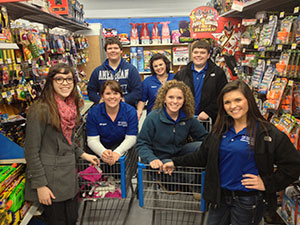Did you know a computer can draw as much electricity as a new refrigerator? Turn it off when not in use or switch on its energy-saving mode. Also, cell phone and mp3 player chargers as well as plasma TVs and entertainment centers pull power even when they’re off. Unplug these and other appliances to save on your electric bill. Find more ways to save at TogetherWeSave.com.
App connects residents to Tennessee’s elected officials
NASHVILLE –A mobile app featuring contact information for the 108th Tennessee General Assembly is now available for iPhone, iPad and Android devices. The 108th Tennessee General Assembly app is designed to help Tennessee residents connect with their legislators and contains searchable contact, staff and committee information for all Tennessee representatives and senators.
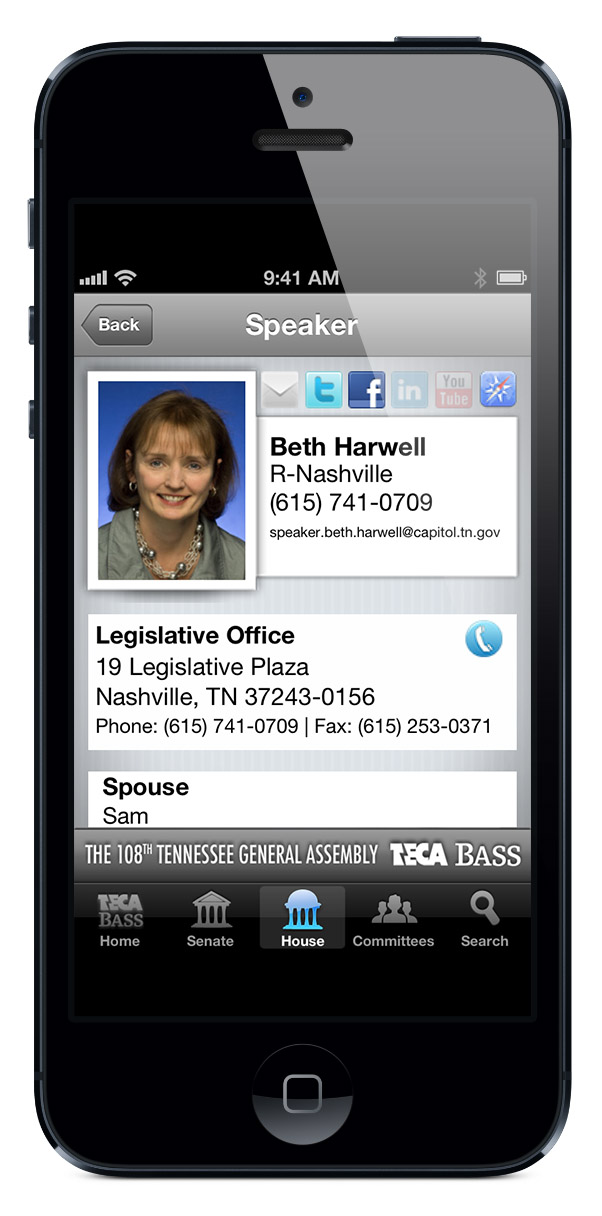 The Tennessee General Assembly app features:
The Tennessee General Assembly app features:
- a continually-updated database of all Senate and House members
- contact, staff and committee information
- fast and easy search function
- one-click call or email ability
The app was developed by the Tennessee Electric Cooperative Association and Bass Berry & Sims PLC.
“We began producing the print directory of the General Assembly more than 30 years ago to be a reference for Tennessee residents and to educate legislators about electric co-ops, ” says David Callis, executive vice president and general manager of the Tennessee Electric Cooperative Association. “Our app continues that tradition — providing a useful tool while educating users about our co-ops. ”
“The app is ideal for anyone who wants to monitor the activities at the state Capitol and is designed to be the best reference possible for those who are interested in or work with Tennessee legislators,” says Dick Lodge, lobbyist with Bass Berry & Sims PLC.
The $4.99 app can be found by searching for “Tennessee General Assembly” in the Apple App Store or Google PLAY Marketplace.
The Tennessee Electric Cooperative Association provides legislative and communication support for Tennessee’s 23 electric cooperatives and publishes The Tennessee Magazine, the state’s most widely circulated periodical. Visit tnelectric.org to learn more.
# # #
Contact:
Trent Scott | [email protected] | 731.608.1519
Download high resolution images of the app and the app icon below:
Co-ops from across Tennessee found opportunities to impact their communities this Christmas. Read how below:
Cumberland Electric Membership Corporation
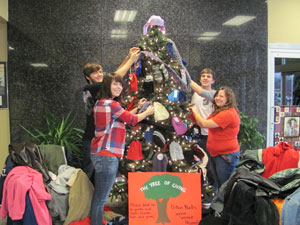 Cumberland EMC offices accepted donations of cold-weather clothing and non-perishable food items to decorate the “Trees of Giving” throughout the month of December. All items collected were delivered to local community assistance agencies who then distributed the items to families and individuals in need. Items were donated by employees, members and various school clubs.
Cumberland EMC offices accepted donations of cold-weather clothing and non-perishable food items to decorate the “Trees of Giving” throughout the month of December. All items collected were delivered to local community assistance agencies who then distributed the items to families and individuals in need. Items were donated by employees, members and various school clubs.
Fayetteville Public Utilities
Fayetteville Public Utilities’ Student Utility Board learns about community service and helping others
The December FPU Student Utility Board meeting included opportunities for the group to give back to the community and help others in need by purchasing gifts for 32 children enrolled at Amana Head Start. The gifts included gloves, toboggans, coloring books, crayons, Hot Wheels cars, bracelets and more.
The youth board also recorded a radio ad for FPU which aired through New Years Day.
“Today we learned how large FPU’s commitment to the community really is,” says Rena Andrews, SUB member. “Thank you so much yet again. Having the opportunity to give back is the most heartwarming and amazing experience. I sincerely appreciate everything the board has done for me.”
“The shopping we did today for the little kids was so much fun,” says Jonathan McLeod. “It feels great to help the kids out in our community. It is such an eye opener. And this is what Christmas is really about.”
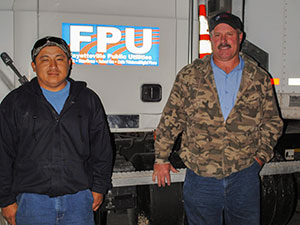 Fayetteville Public Utilities and employees help play Santa for needy children
Fayetteville Public Utilities and employees help play Santa for needy children
FPU donated their semi-truck driven by Michael Porter and Gerardo Villafuerte to assist the Fayetteville Rotary Club, The Elk Valley Times, Fayetteville Fire Department and many others in efforts to transport toys to for the Lincoln County Toy Drive.
The FPU truck used to pull the Big G Express trailer is typically used to haul heavy equipment to work sites. Michael and Gerardo teamed up to lend a helping hand with the three nights scheduled for purchasing toys for needy children through the Lincoln County Toy Drive.
On three separate nights, the men accompanied the volunteer shoppers as they purchased toys and other items, helping load the toys in the truck and transporting them to the storage facility for distribution.
“We were glad to help,” says Porter. “The toy drive was very well organized, and it was an enjoyable experience to work with them. I hope to help again. “You think about those kids who are in need, and it makes you proud to be a part of something like this,” says Villafuerte.
Holston Electric Cooperative
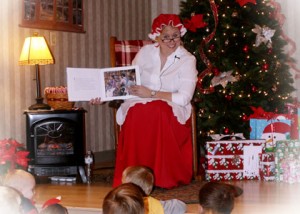 For the past nineteen years, Holston Electric Cooperative employees, board members and retirees have served as “Secret Santas,” providing a pizza party in the cooperative auditorium, gifts, and a visit with Saint Nick for Hawkins County foster children. In 2012, HEC provided special Christmas activities for forty-three children from six weeks to thirteen years old.
For the past nineteen years, Holston Electric Cooperative employees, board members and retirees have served as “Secret Santas,” providing a pizza party in the cooperative auditorium, gifts, and a visit with Saint Nick for Hawkins County foster children. In 2012, HEC provided special Christmas activities for forty-three children from six weeks to thirteen years old.
Meriwether Lewis Electric Cooperative
 Adopt a Class Gingerbread Houses
Adopt a Class Gingerbread Houses
Sandy Qualls’ second grade class at Centerville Elementary School built gingerbread houses with their Adopt-A-Class Sponsor Meriwether Lewis Electric Cooperative on December 14. From left, front row, Caleb Simpson, Addie-Gene Puckett, Meredith Kelley, Jade Yontz, Trevor Buchanan, Marley Baker. Second row, Julia Daniels, Riley Johnston, Elizabeth Diggers, Bethan Diggers, Kaelinn Trom, Sloan Rochelle. Third row: Keelan Jogan, Weston LaRue, Harmony Dansby, Aaron Sullivan, Devin Rochelle. Back row: MLEC Employees Chad Blackwell, Mike Potts, Eddie Benz, Gene Hal, Steve Skelton and Eric DeVault.
Ornament Contest
 A special banquet was held December 7, to honor winners in Meriwether Lewis Electric Cooperative’s annual ornament contest. It took place in the cooperative’s Touchstone Energy® Conference Center located at their Centerville location.
A special banquet was held December 7, to honor winners in Meriwether Lewis Electric Cooperative’s annual ornament contest. It took place in the cooperative’s Touchstone Energy® Conference Center located at their Centerville location.
“It was our biggest year ever with over 130 entries,” says MLEC Member Services Supervisor Vanessa Clayborn. “The students did a great job designing ornaments to resemble everything from reindeer made from light bulbs to peacocks made from pinecones. We hope they had as much fun making them as we did looking at them.”
A first place winner for three grade divisions was recognized in each county served by the Tennessee cooperative. All winners were awarded a $50 gift card. Of all winners present at the banquet, one name was drawn for a family entertainment grand prize. It included a Nintendo Wii with extra controls, Wii games, a personal DVD player, movies, and board games. The winner was Logan Morris of Perry County.
“We started the contest in 2006 as a way to celebrate our youngest members and their families,” says Clayborn. “We are thankful to the schools and parents for encouraging students to participate and learn about their locally-owned utility.”
It’s time to choose your cooperative’s couples (or individuals) to attend the 2013 Tennessee Young Leaders’ Conference on Friday and Saturday, Feb. 22 and 23, at the Drury Plaza Hotel in Franklin.
This highly regarded conference is a combined effort of TECA, the Tennessee Council of Cooperatives (TCC) and the Tennessee Farm Bureau Young Farmers & Ranchers organization. Your TCC dues cover the conference registration fee, hotel room cost and cost of conference meals. As soon as the 2013 conference program is finalized, it will be posted on our web site and at tennesseecouncilofcoops.org.
TCC’s annual conference provides cooperatives across the state a unique opportunity to educate its young leaders regarding the benefits of cooperatives. Your TCC council has worked hard to build a foundation of appreciation and support for existing cooperatives among conference participants. Those attending the 2013 conference will be exposed to ideas and information that will enable them to add value to their own businesses, form new niche cooperatives with others in their communities and meet the challenges of the future with cooperative marketing innovations.
More than ever, to be selected for this conference should be considered a true honor and opportunity for your participants. Carefully select attendees. Sending outstanding people to this conference may be your single most important outreach activity to ensure that the cooperative way of doing business remains strong in the future.
Couple(s) or person(s) chosen should be:
- under 40 years of age
- interested member(s) of your cooperative
- persons who will benefit from this educational experience
For attendees with young children, childcare will be provided during the meeting sessions.
Please select your representatives, complete a copy of the attached registration form in full and mail, e-mail, or fax it to Roberta Smith, TCC’s Administrative Secretary-Treasurer by Friday, Jan. 25. We will need one registration form per couple or per single participant. Once the completed registration form is received Roberta will make hotel reservations for the couple or person you have chosen.
[button link=”http://tennesseecouncilofcoops.org/youngleadersconf.htm”]Learn more →[/button]
Registration Form
Which appliance uses more energy: a refrigerator or television? Consumers may not realize that some large entertainment TVs—when used an average of five hours per day—can cost more to operate than a new, basic refrigerator.
According to the U.S. Energy Information Administration, 44 percent of American homes have three or more television sets, and each new set adds to a home’s monthly energy bill.
In the market for a new television? You’re not alone—U.S. consumers purchased an estimated 40 million new televisions with an average screen size of 50 inches last year.
To keep your electric bills in check, here are some tips to consider before buying a new television:
Display Tactics
Three parts of a TV impact energy use: display technology, screen size, and resolution. Plasma and liquid-crystal display (LCD) are the two most popular types of display technologies. Plasma screens often are cited as the largest energy user―mainly because their large 42-inch to 65- inch screens typically draw between 240 watts to 400 watts.
LCD TVs don’t need much power to operate―111 watts on average. Most LCD screens range in size from 21 inches to 49 inches. These TVs fall into two categories: those with cold-cathode fluorescent lamps to illuminate the screen; and backlit models employing a light-emitting diode (LED). LED units offer several benefits, notably better picture quality and thinner and lighter screens. They also use slightly less energy, at 101 watts.
Most prospective buyers already have the ideal screen size in mind; remember that the larger the screen, the more energy you’ll drain. And although a high-definition TV (HDTV) transforms the latest blockbuster movie into a theater-like living room experience, these sets generally use more power to generate better picture clarity.
ENERGY STAR Boosts Ratings
ENERGY STAR TVs cut an estimated $3.5 billion from consumer electric bills annually. The joint energy efficiency ratings program of the U.S. Department of Energy (DOE) and the U.S. Environmental Protection Agency (EPA) created the first set of voluntary television efficiency standards in 1998. Today’s ENERGY STAR-qualified screens use, on average, 40 percent less energy than standard models, whether you’re watching the latest hit show (active mode) or have the screen turned off (standby mode).
Standards are constantly ratcheting up. In 2008, a 50-inch ENERGY STAR-rated television used 318 watts on average. In 2010, those sets had to curb energy use to 153 watts or less, and by 2012 50-inch TVs could not drain more than 108 watts. ENERGY STAR provides an online guide so potential buyers can find qualified televisions ranked by energy use, size, brand, and display type at www.energystar.gov.
ENERGY STAR Partners like TopTen USA also maintain lists of the top energy efficient televisions (and other household appliances) based on size at www.toptenusa.org.
Look for Labels
The Federal Trade Commission (FTC) has recognized the need for education and easy comparisons for the amount of energy televisions consume. In 2011, a yellow Energy Guide label—a common sight on refrigerators, dishwashers, and other large appliances—became a requirement for TV.
“TVs now vary widely in the amount of energy they use,” comments FTC Chairman Jon Leibowitz. “By comparing information on the Energy Guide labels, consumers will be able to make better-informed decisions about which model they choose to buy, based on how much it costs to operate per year.”
The label compares the annual operating cost of a specific television to the plug-in cost of similar models. The label must be attached to the front of all televisions; websites selling televisions must also provide an image of the label for prospective buyers.
If you’re not in the market for a new TV but want to make sure your model is operating efficiently, these tips may help you save energy:
- Turn off the TV and other connected devices when they’re not being used—consider using smart power strips to eliminate continually power draw.
- Reduce TV brightness by turning down the LCD backlight―you’ll save energy and still retain good picture quality.
- Turn on the power saver mode, which many new TVs offer
- Control room lighting. While many energy-saving tips reduce brightness of the screen, you can compensate by dimming lights around your TV.
Your television set isn’t the only energy-guzzler in your residence. Visit www.TogetherWeSave.com to find more ways to save energy and money at home.
Sources: ENERGY STAR, Federal Trade Commission, Cooperative Research Network, CNET.com, Energy Information Administration
Megan McKoy-Noe, CCC, writes on consumer and cooperative affairs for the National Rural Electric Cooperative Association, the Arlington, Va.-based service organization for the nation’s 900-plus consumer-owned, not-for-profit electric cooperatives. Brian Sloboda contributed to this article.
David Callis, executive vice president and general manager
When we talk about our community, we’re usually referring to a town or neighborhood. The nation’s electric cooperatives have a somewhat different perspective on community. Our community is local yet it extends hundreds of miles away.
A good illustration of that concept involves a Virginia co-op aptly named Community Electric Cooperative. Tennessee line crews have worked there following two recent storms, providing emergency assistance. Community EC also sent crews north to aid with power restoration efforts in areas devastated by Hurricane Sandy. Those linemen, who had already worked several days maintaining and restoring electric service at their own co-op, packed their bags, loaded their trucks and headed north into New Jersey and New York.
Tennessee’s electric cooperatives have adopted “Community” as our theme for 2013. For us, it’s more than just a slogan. Our roots in the community go back to the farmhouses and meeting places where we were formed. Today, those community beginnings remain woven into the fabric of everything we do, and our electric cooperatives live out that commitment to our members every day. The work we do is for the benefit of the members we serve — not for shareholders, investors or faraway owners.
From the time the first lines were strung in our communities until today, it’s been a never-ending commitment. In the early days, keeping the lights on was enough. Yet as times change, new needs arise. Our co-ops are always there to meet the challenges and strengthen the bond between community and cooperative.
Today, our member-owned electric cooperatives are vital social and economic components of the communities we serve, providing much more than just keeping the lights on.
As I’ve mentioned before, we can’t control every aspect of what goes into determining the price of electricity. Another large and important part of our “community” is the Tennessee Valley Authority. At one time, most of the electricity we use was generated by TVA’s hydro and coal plants. Over the years, the percentage of hydro power has diminished, nuclear power came on the scene and coal-fired generation has declined. It’s a daunting task for TVA to generate the power that our communities need at a cost we can afford.
As energy prices have risen, we’ve emphasized energy efficiency and conservation. That’s a delicate balancing act as new ways of using electricity are introduced to our communities; think about the number of televisions, appliances and phones plugged in at your home. Our educational efforts also include safety, renewable energy solutions, economic investment and youth programs. Often, electric co-ops are among the largest taxpayers in the towns or counties we serve.
Innovation adds challenges to operating our systems, but it’s nothing we can’t handle. As we’ve done over the course of our existence, we’ll adapt and meet the changes of our communities.
As for those linemen from Community EC, they were joined in storm-ravaged areas by hundreds more from other states, including Tennessee. They were tired, and they needed rest. But while their co-ops back home were in good shape, there were others that were in need.
Even though those that were in need were hundreds of miles away, they were never really out of the reach of the cooperative community. You never really are.
Mike Knotts, director of government affairs
One of the really interesting things about working around and with the great people who bring you The Tennessee Magazine is that I get to hear about a lot of really awe-inspiring people, places and things here in our great state. I particularly enjoy the features Bill Carey, the Tennessee History Guy, regularly brings to these pages. Take the time to read these and you just might learn something exciting about that dusty building or marble monument that you never really noticed on your way to work each day.
However, it took a couple of guys from South Dakota to teach me about another way Tennessee touches the world. The Southwestern Corporation is based in Tennessee, and while it has a number of companies under its umbrella, its primary business is teaching college students how to sell books door-to-door. In doing so, these young salesmen can earn enough money to pay their college tuition. But what they really learn are the skills and, more importantly, the attitude to become successful in whatever field they choose.
This army of salesmen is drawn from every state and around the world. This diverse group comes to Nashville at the beginning and end of each summer to train and complete the administrative tasks necessary to earn their commissions. I have personally seen the throngs of young men and women, full of energy and vigor, as they begin and end their summertime journey. It’s inspiring to hear the stories of some of their successes and the lessons learned through some of their failures.
But the most important lesson they learn, in my opinion, is the concept of volition. I have no idea if it is described to them in so many words, but it is clear through the actions of the many, many Southwestern “alumni” who have achieved great things in different occupations and endeavors that this concept is a unifying factor among them.
Volition:
1. an act of making a choice or decision
2. the power of choosing or determining
Source: Merriam-Webster Dictionary
“Volition” was brought front-and-center to my attention during the recent annual meeting of the Tennessee Electric Cooperative Association. During this time of work, we often pause and take a moment to hear a message from someone who might bring a different perspective to our discussions.
This year we were privileged to hear an inspiring keynote address from Maj. Dan Rooney, a retired F-16 fighter pilot and PGA golf professional (I joked with Maj. Rooney that he is living BOTH of my dreams!). So it’s only fitting that his pilot call sign and nickname is “Noonan” after the main character from the classic golf comedy “Caddyshack.” Having served three tours of duty in Iraq as well as having experience in building, owning and operating a golf course, he could have spent his time wowing us with his abilities to accomplish many very difficult tasks — and accomplish them well. His presentation contained loud videos demonstrating the awesome power and speed inherent in the F-16 fighter jet, and he could have bragged about the very small and select fraternity of highly trained American fighter pilots of which he is a member.
But his passion in life is the organization he created: the Folds of Honor Foundation, built to provide college scholarships for the survivors of those heroes who have been killed or disabled in service to our country. You see, in the middle of marking off the many tremendous personal accomplishments in his own life, Rooney realized that his time and efforts had a greater purpose. He realized his life could have an impact. He realized that it wasn’t all about him.
Today, Folds of Honor is a tremendous success. Its main event, Patriot Golf Day, is now a Labor Day weekend tradition in which golfers add $1 to their greens fees at participating courses. That simple act has raised more than $13 million and counting for scholarships for these most deserving Americans. Dan exercised his volition — he made a conscious decision to do something impactful for the sake of others, regardless of how hard it might be.
Just like Maj. Rooney, so many Southwestern alumni learned about the importance of making their own choice. “When I awake today, what will I choose to be?” Happy or sad? Optimistic or sullen? “When I awake today, what will I choose to do?” Work hard toward my goals and aspirations? Or resign myself to an unknown fate?
Attitude is a choice, and we all have been given the gift to decide how we will conduct ourselves. As we start a new year, I challenge you to make an impact. It doesn’t have to be as dramatic and large as Maj. Rooney, but you can make a difference in your community. All it takes is a decision on your part to do it.

Tennessee Electric Cooperative Association
2964 Sidco Drive, Nashville, TN 37204
Phone : 615.367.9284



